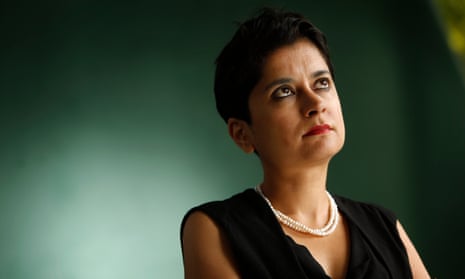Shami Chakrabarti warned yesterday that our leaders in the “misjudged misnamed ‘War on Terror’” have fallen into a “language trap that both dignifies the enemy and undermines our own democratic doctrine”.
The director of the human rights campaign group Liberty, giving the annual Reading Agency lecture to a sold-out audience at the British Library in London, said that “phrases such as ‘detainee’, ‘water-boarding’ and ‘extraordinary rendition’ became more palatable euphemisms for ‘prisoner outside the law’, ‘drowning’, ‘kidnap and torture’ in freedom’s name”.
“When will our leaders truly learn from the misjudged, misnamed ‘War on Terror’ and the language trap that both dignifies the enemy and undermines our own democratic doctrine?” she asked, pointing to the “self-styled Islamic State”, which, “can dehumanise the Parisian victims of its recent barbarism as long as they are ‘crusaders’ or ‘pagans gathered for a concert of prostitution and vice’ rather than the easy innocent civilian targets that they plainly were”.
Chakrabarti also highlighted George Orwell’s essay Politics and the English Language, in which the author argues that political language “is designed to make lies sound truthful and murder respectable, and to give an appearance of solidity to pure wind”, and which she said was more “Orwellian” to her than his vision of a dystopian future in Nineteen Eighty-Four.
“Orwell’s genius in 1984 notwithstanding, my idea of the truly ‘Orwellian’ has never been surveillance capacities being debated in Britain and across the world in a climate of fear,” she said. “Ultimately ‘Orwellian’ to me evokes his 1946 essay Politics and the English Language, and the way in which the abuse of language can lead to the contortion of truth and ultimately the abuse of people themselves.”
In a lecture entitled On Liberty, Reading and Dissent, Chakrabarti also criticised the response of British politicians who “rushed to Paris to say ‘Je suis Charlie’” following the murders of journalists at the satirical French magazine, “only to return to London with promises of crackdowns on debate in mosques and universities as part of their ‘domestic extremism’ agenda”.
“The relevant consultation paper talks of refusing to engage with and denying platforms to extremist people who fail to share our ‘British values’, thus denying the universal values that we share with all democrats and the vital importance of winning the battle of hearts and minds with open engagement and fierce debate,” said Chakrabarti, citing Harper Lee’s Atticus Finch as a hero who “used the law as a sword of societal as well as individual justice” and led her to study law.
“To be clear, just as libraries should be free and open and books must be saved from the fire every time, debates however shocking, difficult and painful, must be had,” she said. “There is no such thing as no platform in the internet age, merely closed and narrow platforms where hate goes unedited and unchallenged by humanity and reason.”
Chakrabarti was giving the fourth annual lecture for The Reading Agency, a charity which sets out to inspire people to read across the UK. Previous lectures have been given by Neil Gaiman, Russell Brand and Jeanette Winterson. She said the experience was a “privilege”, adding that “when even our Human Rights Act is threatened, reading, thinking and arguing about abuses of power have rarely been more essential to protecting precious freedoms”.

Comments (…)
Sign in or create your Guardian account to join the discussion